Opinion
Internal haemorrhage as threats to telecoms services

By Sonny Aragba-Akpore
Without sounding a death-knell,telecommunications service companies are troubled.
Although,the big players display glamour and pictures of “all is well” what you see is
nothing but a facade as the companies are grasping for breath as a result of the internal haemorhage plaguing their service provision.
And unless government rejigs its policy on foreign exchange as a quick intervention, to cushion importation of equipment to boost services,many of the so called A grade players may go into worst shapes.
Operating Expenditure (OPEX) has more than doubled since 2021 and with dwindling foreign inflows through Foreign Direct Investments(FDIs), some telcos are now holding on to straw to survive.
The operators see their biggest challenges in their inability to provide quality of service and a result of recurrent vandalism of their infrastructure.
Every operator has become its own electricity power provider as supplies from national grid are now a pipe dream.Added to this, the spiral costs of diesel and its alleged incessant theft of same by unnamed persons creates bigger problems.
The rising cost of diesel is very worrisome as a litre that sold between 1200/1400 at pump landing at site is now as high as NGN 2000 per litre on site in some parts of the country.
Confirming the internal haemorhage,in the sector,an official who wants to be anonymous said part of the haemorrhage stems from significant high interconnect debts between players. Telcos are being owed alot of money thereby leading to terminal struggles for survival.
The telcos also list Political incursions as a major drawback hindering survival.
On the issue of Forex sources : “willing seller, willing buyer on forex, problem is bills that are being settled now due to long wait for forext transactions when Forex was at 700N =US1 and now being paid at the prevailing rate of 1,400+
High OPEX remains a major issue coupled with Low FDIs leading to concerns in industry sustainability.
They claim that the regulator is in a dilemma especially on tariff hike issues.
So Telcos are now on bent knees scrapping to provide services below cost.
And the Government looks elsewhere inspite of manifest inflation on every single item especially now that Infrastructure are experiencing decay and to replace same is slow and painful as telcos lament their inability to deliver robust Services .
To underscore a picture of this haemorrhage,
MTN Nigeria and Airtel Africa (the only two telcos publicly traded) lost N479 billion to currency revaluation and recorded reduced profit margins in the first nine months of 2023.
In its financial report for Q1, 2024, for instance,MTN reported a second successive loss after declaring a loss after tax of N392.7 billion for the first quarter of 2024.
This is coming despite growing its service revenue by 32.0 per cent to N747.3 billion year-on-year, the telco recorded its second loss since it was listed on the Nigerian Exchange.
It noted that its net loss for the quarter further increased its accumulated losses and negative shareholders’ funds to N599.2 billion and N434.7 billion, respectively. It highlighted that its profit after tax adjusted for the net forex loss declined by 57.8 per cent to N47.1 billion.
“Further adjusting for the impact of the naira devaluation in OPEX, PAT would have been down by 5.3 per cent to N105.6 billion,” MTN said. The telco’s net foreign exchange loss stood at N656.37 billion.
MTN Nigeria’s chief executive officer, Karl Toriola, noted that severe macroeconomic headwinds overshadowed a solid operating performance. He said: “The operating environment in the first quarter remained very challenging, with rising inflation and continued naira depreciation off an already low base.” He stated that the naira’s devaluation and record-high inflation have impacted the operating environment for businesses in Nigeria.
The operators are agitating for tariff hikes as part of measures to sustain their operating expenditure.But that is half way through if all they get the regulator,s ,Nigerian Communications Commission (NCC)’s nod.
The operators are trying to justify the tariff increase because “Consumer prices in other sectors have seen a steep rise over the last six years as they adjust to reflect macroeconomic realities. However, telco prices have remained flat and even declined. Contrary to the price trends in other sectors, telcos have had to adjust for the macroeconomic headwinds caused by an increasing erosion of margins. Other highly regulated sectors such as power and insurance have implemented price increases over the last year. Insurance prices have risen 200 per cent with power raising prices by over 40 per cent.”
They also decry the strong macroeconomic headwinds which have occasioned tough operating conditions, leading to a decline in CAPEX (Domestic) and Foreign Direct (Capital Inflow) investments into the industry by 30.37 per cent and 46.9 per cent respectively between 2021 and 2022.
These headwinds include inability to source foreign exchange and attract foreign direct investment because investors have become uncomfortable because of the grave economic uncertainty in the country.
Without meaning to link the crisis to a flip flop economy,the operators think unless something urgent is done,providing quality of service will not be sustainable because of the multiple effects of operating costs.
Owing to the macroeconomic crisis , resulting in increased cost of operation and overheads, most telecom companies in Nigeria have been posting losses, making it difficult for them to pay their Annual Operating Levy (AOL) to the Commission as and when due.
The operators are worried about the restrictive regulatory approach which is unconducive for the highly needed innovation in this evolutionary era of newer communication technologies.
“We invite the EVC to note that the convergence of telecommunications with digital and multimedia services has greatly reduced the revenue streams from traditional telecommunications services (voice, SMS, etc.)and to survive this digital era, telecommunications operators have no choice but to quickly evolve into digital and platform service providers which enable newer and advanced means and uses of communications technology and this is only possible in a regulatory environment that enables the development of innovative products and services, with a flexible regulator that is well-informed on the latest technology developments/requisite regulatory frameworks, and an appreciation for the reverberating impact of derailing this progression.” they lamented.
In 2023,MTN declared its first loss after tax of N137 billion. and Its retained earnings and shareholders’ fund fell to negative N208.0 billion and N40.8 billion, respectively.
For Airtel, profit before taxes result for the half-year 2023 was much worse, it dropped by a staggering 97.7 per cent – from $516 million to $12 million – compared to the results from 2022.
The report showed that Airtel had consistently grown its revenue in Nigeria since Q2 2018. The only time there was a drop in revenue between quarters was in 2020 when revenue dropped from $377 million in Q1 2020 to $341 million in Q2 2020. This $36 million drop in revenue is nothing compared to the decline seen in 2023.
Its revenue for Q1 2023 was $543 million, a $2 million drop compared to the previous quarter – $545 million in Q4 2022. By Q2 2022, the drop in revenue increased by $15 million, from $543 million to $528 million.
Although figures of losses sustained by the other unquoted telcos are unavailable,there are strong indications that all is not well.
Several of them are owing interconnect fees and generally unable and or late in payment of AOL.
Consequently,the late and inability to pay AOL to the NCC tells one of the bad stories of the situation on ground.
In general terms,the sector is believed to be wobbling and In fits.
Deposit Money Banks are also part of the telcos headaches as they are believed to be indebted to the tune of about Two hundred billion naira (#200b) in unsettled Unstructured Supplementary Service Bus(USSD) services rendered by telcos to the banks.
The telcos also bemoan the fate of their equipment and infrastructure across the country.
They had canvassed for comprehensive protections for their infrastructure by suggesting to government to make telecommunications equipment Critical National Infrastructure (CNI) but government officials say this is “Work In Progress (WIP) as the telcos wait in limbo.
Apart from these,they have had to contend with multiple taxations whereby the Federal Government,states and council governments put immense pressure on telcos for various taxes at different levels.
Apart from the taxes,Right of Way is an albatross that had defied any solutions and so the telcos have had to live with it.
The telcos say that
“notwithstanding the much-touted resilience of the telecommunications sector and its commendable double-digit contribution to the GDP, we wish to strongly impress on the NCC the pressing need to avert the grave risk looming in the industry’s horizon by taking clinical and definitive action towards repositioning the industry for growth and increased investments, because ultimately , it is our considered view that a thriving telecommunications sector will have a far-reaching effect on:
o Mobile Network Operators as they will remain going concerns who can carry on sustainable operations with the overall intention of value creation and enabling connectedness;
o The maximization of consumer welfare for Nigerians who, as the the NCC rightly noted, are the most critical stakeholders in the telecommunications value chain; and
o The Government itself, given that the net effect of a sustainable communications industry is bolstered investor confidence, increased contribution to GDP and, by extension, revenue growth in the form of payment of increased direct/indirect taxes and Annual Operating Levies” in that regard.
Opinion
INSPIRING TAKEWAYS AT TUNDE OLUSUNLE’S DIAMOND SOIREE
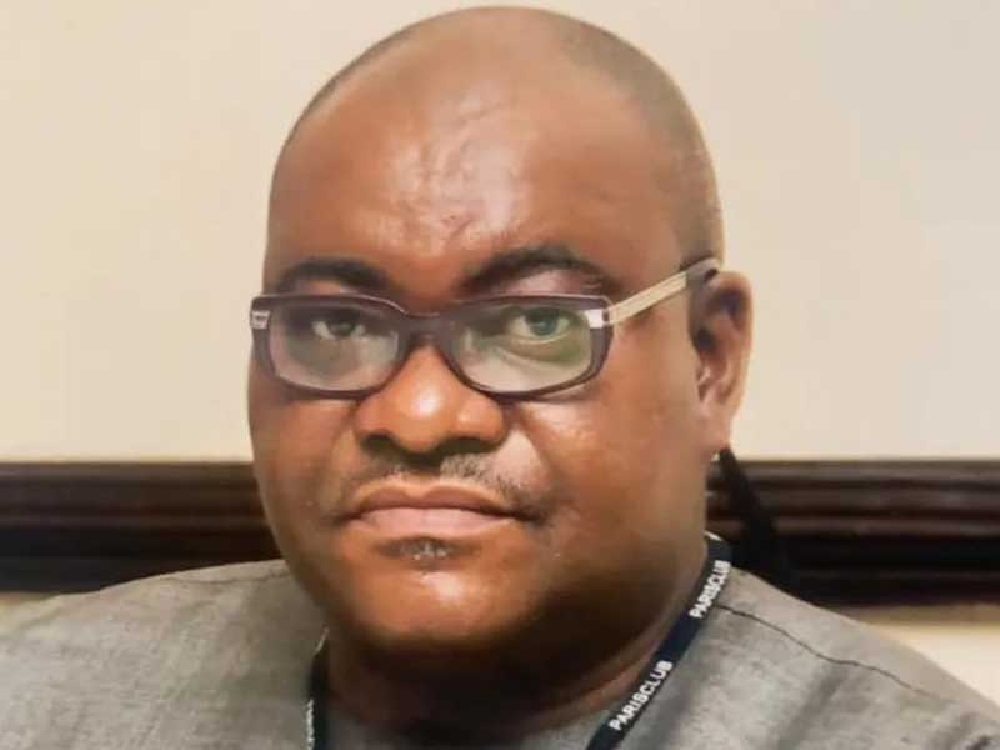
BY BOLAJI AFOLABI
Oftentimes, it’s always challenging to organize commemorative parties for those who have distinctions in this pastime. Dr. Tunde Olusunle, Adjunct Professor of Creative Writing at the University of Abuja; recently re-named Yakubu Gowon University is one of the few masters in the game. Over the last two decades of close relationship with him, he has played massive roles in organizing parties for people. Call him a highly-rated events planner, you may not be wrong. He is not the usual, typical party planner around who has taken up the vocation as business. Olusunle does this for people dear to him; friends, bosses, colleagues, associations, communities, and more pro bono. At any of these occasions, he throws everything towards making the event successful. He invests his time, intellect, organisational savvy, and personal resources; months, weeks, and days to make the event grandiose. Some of his close friends eulogized his dexterity, expertise, and capacities in single-handedly coordinating parties, events, and other celebrations.
The writer, cognisant that Olusunle will mark his birthday in the month of March, was somewhat worried. Why? This year’s birthday was different, as the multi-tasking professional will climb “six stairs” and join the unique club of 60. So, who will coordinate a befitting birthday shindig for the “master organizer?” Can such match the quality of similar others that Babaeto; one of his titles, and moniker loosely translated as “Chief Organizer” has arranged for people? How can the standard set by him be met, if not surpassed? Still pondering, a thought came to mind. Given the national economic crisis that has led to accentuating poverty, staggering hyperinflation, disabling unemployment, corrosive hunger, and more, Olusunle; who is ever conscious of situations around him, may spring surprises. He may opt for simpler and modest celebrations.
About two weeks to d-day, an e-invite forwarded to the writer confirmed one’s thought. The card was beautiful in colours; aesthetic in design; and unique in words. Having close similarities with Babaeto’s imprimatur, it read, “please join us for drinks, bites, and laughter as we commemorate the Diamond Birthday of our father, husband, brother, and good friend; Tunde Olusunle ……” Further checks confirmed that the event was packaged by Dr. Funmi Olusunle, with Aramide, Yomi, and Tobi; wife and children of Babaeto was to be a modest gathering of people. On this, the “plotters” scored a bull’s eye. Surely, Olusunle will be excited that his ever-loving, dependable, and reliable better-half of over three decades, and scions are gradually “edging him out” in the plotting, planning, and execution of numerous surprise parties for people.
The weather on Sunday, March 30 was clement and friendly, away from the scorching sun of the previous day. This was the first surprise while heading to the event. Driving through the Gaduwa-Lokongoma axis of the capital city, the writer had another round of pleasant surprises. Making a detour, vehicular movements to the Estate gate; which was over 400 meters away, gave an idea of what to expect. After “snaking and snailing” through the entrance, which was about 100 meters to the residence, it became clear, and evident that this may not be a small event, as originally planned. The writer, struggling for a comfortable parking space, recalled what Pastor Tumo Ojelabi; a retired Director, Federal Ministry of Information earlier said, “Oga is a friend to all. It is almost impossible to have a small party to mark his 60th birthday. Many people will attend the event, either invited or not.”
Scheduled to officially commence by 5 pm, the programme was up and running an hour before. Given the elaborate preparations for any eventualities, the early arrivers were treated to a collage of bites, drinks, and soul-lifting songs. In between, there were memorable photo sessions on the lush green carpet emblazoned with Olusunle’s very visible portrait properly affixed. As the day progressed, more people made their ways to the beautifully decorated outer foyer of the celebrant’s residence. Hearty exchange of pleasantries, excited high-fives, warm embraces, friendly hugs, and more swept the entire atmosphere. The lively gathering was an admixture of grandparents, fathers, and mothers. Not forgetting the youths, and children. Typical of Olusunle’s enviable virtues of accessibility, humility, humanity, and inclusivity, guests and attendees cuts across different strata of the society.
With Yomi standing-in for the day’s master of ceremonies, (MC), the programme commenced a few minutes past five in the evening. Pastor Omotoba of the Redeemed Christian Church of God, (RCCG) offered the opening prayers, which was brief and impactful. Yomi, as the fill-in compere did a good job, as she was able to galvanize the audience with few jokes, gesticulations, and puzzles. Perhaps sensing the bulk of the happy guests were in their 40s to 60s, she requested for the rendition of early-school rhymes in the 1970s to late 1980s. Masterstroke! Led by a few ladies, the entire place came alive as it brought back nostalgic memories. Thereafter, the MC took over. Aramide delivered a “love letter” that was full of emotions, inspiration, and gratitude. Tobi, the “baby” of the house, who is a strong supporter of English Premier League’s Manchester United was working behind the scenes to ensure the overall success of the birthday bash.
Virtually all those called to describe Olusunle in one word, used the opportunity to heap praises, prayers, and commendations on him. Dr. Tivlumun Nyitse, Associate Professor of Mass Communications at Bingham University, Abuja, confirmed that, “we have been friends for over 40 years. Over the years and decades, the relationship has grown from family to brothers. As I wish him a happy diamond birthday, I advise him to slow down.” Dr. Femi Ajisafe, an agriculture entrepreneur affirmed that, “we both joined, and started work as secondary school teachers somewhere way-off modernity in a rustic, and sleepy community in Kogi state over three decades ago. Happily, we have been together; and our respective families ever since.”
Saluting Olusunle’s resilience, Dr. John Olarewaju, former Director-General, Michael Imodu Institute of Labour and Development Studies, (MIILDS) revealed, “he is ever dogged, determined, and sacrificial. So committed and consistent with writing that he can do it anywhere.” For Dr. Clem Baiye, former Managing Director, Daily Times PLC, “Olusunle is a go-getter.” An obviously joyous and excited Madam Elizabeth Olusunle, Mother of the celebrant expressed appreciation to family members and friends, particularly Dr. Funmi Olusunle for her steadfast love, and consistent understanding of everyone. Mama, also prayed for her dear son. The session ended with an inspiring Yoruba rendition by Anuoluwapo Favour Fabiyi; a hugely gifted and brilliant teenager.
As the evening progressed, it was clear that the planned simple hoedown turned to a classy, high-energy reception laced with flair and flash. Evidently wrapped in panache, pomp, and pageantry. From meals to drinks, jokes, and more, the get-together had trappings of charm, elegance, and sophistication. The dazzles and allure literally arrested everyone all through. It was exciting, entertaining, and memorable. Filled with thrills, frills, grills, and much more. The night was filled with revealing stories and engaging reminiscences that will be inspiring takeaways for many people. The excellent dishing and mixing of “old school” songs got many; including the writer either humming the lyrics, shaking heads, moving bodies or hitting the dance floor.
Indeed, the quality and quantity of guests who came to honour Olusunle; at short notice was a worthy testament of the recognition and acceptability of the celebrant as a “peoples man.” The roll call of personalities was large. Chief Onyema Ugochukwu, pioneer Chairman, Niger Delta Development Commission, (NDDC), and his lovely wife, Dr. Joyce Ugochukwu; AIG Tony Olofu, (Rtd), and wife, DIG Rhoda Olofu; Hon. Leke Abejide, Member representing Yagba Federal Constituency, and his wife were there. Dr. Boboye Oyeyemi, former Corps Marshall, Federal Roads Safety Corps, (FRSC); Pastor Tunde Ipinmisho, former General Manager, Public Affairs, Federal Housing Authority, (FHA); Prof. Sunnie Ododo, former Chief Executive Officer, National Theatre. Dr. Emmanuel Ikpeme, Deputy Secretary-General, Nigerian Football Federation, (NFF); Chief Femi Melefa, consultant and entrepreneur; Pastor Yomi Babaniyi, and wife, and many others graced the occasion. Not forgetting Hon. TeeJay Yusuf, and Deputy Corps Marshall Clement Oladele, who were out of the country and Abuja respectively, but extended their congratulatory messages to Olusunle.
As the elegant soiree spread late night guests had more to savour. Properly garnished, sumptuous delicacies, refrigerated drinks, and eye-popping small chops flowed endlessly. Undoubtedly, the knees-up; according to the British were exhilarating and enthralling. For many, the event, turned out to be a worthy, timely rendezvous of sorts. There was a reunion of old friends; re-kindling of friendships; and building of new networks. Many agreed that it will be an unforgettable experience.
* BOLAJI AFOLABI, a Development Communications specialist was with the Office of Public Affairs, The Presidency, Abuja.
Opinion
CELEBRATING A PRODIGIOUS WORDSMITH: TUNDE OLUSUNLE @ SIXTY
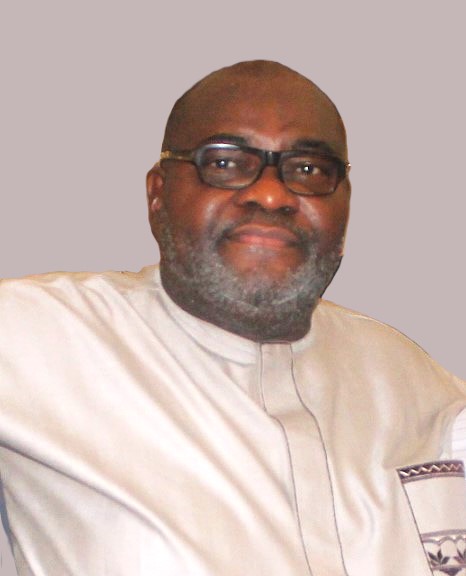
BY BOLAJI AFOLABI
Poring over countless title-ideas for this article, the above emerged from the blues. Further checks about the subject confirmed the title as fit and proper. Describing Tunde Olusunle as a “prodigious wordsmith” is no exaggeration. In every of his work, he comes across as one who has vocabulary virtuosity, and endowed with narrative mastery. He displays unimaginable linguistic dexterity which is intertwined with rhetorical flair, and imbued with creative vision. He carves the right words, and descriptive styles to paint beautiful scenery of complex and cumbersome situations. He crafts, engages, and suspends readers till the last words are happily soaked in. So, the title is both deliberate and intentional.
Dr. Tunde Olusunle, an Adjunct Professor of Creative Writing at the University of Abuja; which was recently re-named Yakubu Gowon University, is a man of many parts. He is a celebrated journalist; author; poet; communicator; and public speaker. Thus, he fits into all the fields where intellect, elucidation, and erudition coalesce. As a Columnist and Editor, he rose to the top of Journalism. In Literature, aside from having degrees, he has many published (and yet to be published) poems. He has written, co-written, edited, and co-edited over a dozen books; earning the Fellowship of the Association of Nigerian Authors, (FANA). In the last few years in academia, he is making exceptional accomplishments as a scholar, teacher, and researcher nurturing and mentoring a new generation of creative writers.
Sometime in the ’90s; during the Late General Sani Abacha regime, the writer went to the Saka Tinubu, Victoria Island, Lagos office of an elder brother; Ade-Ralph Olamife. After late lunch at the classy canteen within the precincts of the Nigeria Telecommunications Limited, (NITEL) offices, the host extended an invitation. He said, “I want you to join me later today to meet a friend coming from Ikeja.” About 7 pm, we (Olamife, two other friends, and the writer) drove into Bishop Oluwole Street in Victoria Island, Lagos. The building was the Kogi state Liaison Office at that time. Surprisingly, the august friend, who came with another person was already seated. After the exchange of pleasantries, the subject of this article was introduced by Olamife. Olusunle, who came with Alhaji Hakeem Bello; later Media Adviser to Babatunde Raji Fashola, (SAN), interacted freely with everyone. During the over two hours sit-out, Olusunle came across as a witty, lively, intelligent, and brilliant personality.
After this first meeting, the writer; through Olamife had subsequent interactions with Olusunle in Ikeja, Maryland, Ikoyi, and Victoria Island areas of Lagos. On every occasion, he exudes confidence and accessibility just as his humble and humane attributes come alive. After over a year of gap, largely due to the analogue communication state, and his relocation out of Lagos, Olamife broke the cheering news of Olusunle’s appointment as the Chief Press Secretary to the Kogi state Military Administrator; Col. Paul Omeruo. A few months later, the writer accompanied (as usual) Olamife; to visit Omeruo in Lokoja. By the way, both Olusunle and Olamife are mutual friends to the Administrator, fondly referred to as PUNO; initials of his names. During the two-week visit, Olusunle was the perfect host; he made every evening eventful and memorable. From discussions, many civil servants spoke glowingly about him. In and around the Lugard House; Administrator’s residence and office, as well as Ministries, Departments, and Agencies, (MDAs), his interpersonal relationships were eulogized. Succinctly, he could be described as a people’s man.
With the birth of democracy in May 1999, and the inauguration of Chief Olusegun Obasanjo as the President and Commander in Chief of Nigeria, the writer partially relocated to Abuja, hoping to explore opportunities in the new government. Watching the Nigerian Television Authority’s flagship news, the advert inviting people to the official launch of the new administration’s “Campaign for National Rebirth” sounded interesting. The writer made his way to the purposely-built Eagle Square venue of the event. As the programme progressed, the presence and importance of Olusunle was very evident. Events over, the writer swiftly moved from the stands down the platform to offer salutations to him. Pushed, shoved aside by over-zealous security operatives, it was a herculean task. At the point of giving up, an incident happened which diverted the attention of almost everyone. Leveraging on this, the writer made his way to the dais. Standing before Olusunle, he called the writer’s name, hugged, and exchanged pleasantries. Quickly, he said, “I’ll be out of Abuja for one week, meet me at Sheraton Hotels next week please.”
The writer’s visit to Sheraton Hotels marked the beginning of a relationship that has grown in leaps and bounds. Either at the Hotel’s Papillon Restaurant or the Poolside Bar, and Nicon Noga (now Transcorp) Hilton Hotel, the compassionate, empathetic, and accommodating attributes of Olusunle always come to the fore. They were unmistakable and unequivocal. During one of the numerous visits, he requested for the writer’s curriculum vitae; without saying what he wanted to do with it? It was discovered, early that he loves working behind the scenes. Beneficiaries of his advocacy, and benevolence only get to know when “food don done for eating.” One recalls on a visit to his 7th floor, Sheraton Hotels “temporary official residence” he beckoned on the writer to accompany him to somewhere. In a few minutes, we were in one of the suites at the Hilton Hotel, only to see Chief Onyema Ugochukwu, emeritus journalist, and public administrator walked in. With shock, suspense, and excitement written on one’s face, Olusunle introduced the writer saying, “Oga, this is one of our younger but silent supporters.”
A few months later, the import of that visit came to light. Through the persistent advocacy, and resilient prodding of Ugochukwu and Olusunle, President Obasanjo gave approval for major recruitments to strengthen the rebirth campaign, and public affairs management of the new government. So, the writer and other people benefitted from a forward-thinking proposal that was primarily targeted at media professionals who were part of the Obasanjo presidential campaign organization. Pastor Tumo Ojelabi, a retired Federal Director who was one of the beneficiaries declared that, “Oga, is a fastidious personality, a determined helper who can be positively stubborn, and dogged when pursuing a course that he has strong conviction about.” Continuing, Ojelabi, who was the official Photographer to Obasanjo during the presidential campaign said, “but for his resilience, courage, and never-quiver spirit; and Oga Ugochukwu, many of us who toiled during the campaigns would have been left dry.” For Mr. Taiwo Akinyemi, who was Obasanjo’s campaign Official Videographer, “Olusunle is a fighter; a dynamic fighter for other people. When he realized that politicians who did not contribute much to Baba’s electoral success were getting their loyalists into the new government, he fought relentlessly for us all. God used him to get me employed in the federal civil service, I remain eternally grateful.”
Olusunle is a pan-Nigerian, totally detribalized, and not given to ethnicity, religious segregation and similar stereotype. Described by close friends as diligent, dedicated, and devoted to friendship, Olusunle remains a restless and tireless quester for knowledge and new challenges. Given his multi-dimensional, and multi-tasking skills and proficiencies, he can excel in whatever profession, assignment, and position. Energized by his voracious search for new ideas, he is almost, always thinking out of the box. Very ingenious, creative, and imaginative, one recalls few initiatives that came from his fertile mind during the Obasanjo presidency. Persistent encouraging words about Nigeria’s sports which led to the inclusion of the “sports brief” to his schedules. Advocacy for the hosting of the Commonwealth Heads of Government Meeting, (CHOGM) at any of the nation’s resorts; which informed him leading a team of journalists, tourism experts, and bureaucrats to the Yankari Games Reserves in Bauchi. What about the National Media Tour, though initiated by him but hijacked by a few top government officials who at the end muddled the entire programme?
Corroborating, Mr. Vincent Oyefeso, a retired Federal Director, and another beneficiary of the Obasanjo appointments approval, said, “he is an illustrious Nigerian and a patriot per excellence, who bestrides many walks of life as an intellectual collossus, a humanist of no mean hue, and an advocate of the finest social ethos. At the realms of public communications, the academia, and public service, he exudes the best practices worthy of emulation by right-thinking compatriots.” For Mr. Ukadike Uwabor, a media communications consultant, “since I’ve known him, he has remained consistent with the core values of excellence, versatility, and intellect. He relates perfectly with different people no matter the age, religion, tribe, or social status. Little wonder his friends cut across different strata of the society. That the people of Umukabia autonomous community in Abia state conferred on him a chieftaincy title; which is outside his geographical, ethnic, and linguistic zone speaks volumes about his personality.” Olusunle by the way, has few other titles bestowed on him in different parts of the country.
Agreed, no human being is perfect but the writer has personal experiences about Olusunle that remains nostalgic. Indeed, the over two decades relationships have grown from one stage to the other. From boss to teacher, mentor, and motivator. He has played (and continues to play) different roles in one’s professional development, and career progression. Perhaps, he may not realize this; while working with him, Olusunle doesn’t attend meetings alone. The writer, Late Alhaji Wasiu Anjous, and (on few occasions) Akinyemi accompanied him to any meeting, particularly with MDAs. Another striking feature was that he introduced you as a “colleague.” With that, one’s stock, respect, and recognition increases. One of the fall-out of such remarkable style happened at the 2004 Olympics Games in Greece, when Late Mr. Solomon Matankari, Nigeria’s Chef de Mission, and Sports Ministry’s Permanent Secretary insisted on the participation of Anjous and the writer in high-level meetings.
Not persuaded by the hierarchical structure of the civil service, Olusunle places premium on availability, delivery, and consistency. Just a few months after being deployed to his office, the writer had a baptism of fire. Barely 48 hours after one of the regular presidential chats, Olusunle passed the recorded tape, and declared, “do transcribe and deliver in three days.” Sensing shock, and surprise, he encouraged, “you can do it, go at your pace.” On another occasion, a few days after commending the writer on a piece, “From Saw Dust To The Skies,” he said, “write a speech for Dr. Mrs. Kema Chikwe, the Aviation Minister, for a programme this Saturday to be held in Garki, Abuja.” Though tough but exciting, it marked my entry into the exclusive class of speech writers; till this moment. Sometime in 2023; after long hiatus from opinion writing, due to a new assignment at the National Assembly, the writer did a piece. Impressed, Olusunle called immediately, “BJ, I’ve just read your brilliant article. I encourage you to make this more regular, please. I’m available to offer any support where and when necessary.” Truly, he has kept faith to his promise in the over thirty articles written between December 2023 and now.
This is the man we are celebrating today, and always. Olusunle is an extremely organized personality, whose writings and interventions are laced with irrefutable data, educative instances, and inspiring suggestions. When occasions demands, you can’t help but applaud his depth of knowledge, information reservoir, deep vistas, and un-ending capacity. Oyefeso prays that, “the Lord grants him peace as he steps into the sixth floor. The Father of Lights will continually uphold and uplift him from Glory to Glory in Jesus Name.” Mr. Jacob Zwings, aide to Director-General, National Orientation Agency added that, “Oga Tunde, in his own way has impacted positively on the lives of people. On the occasion of his Diamond jubilee, I pray that God will perfect everything that concerns him and his family.” Akinyemi declared that, “just as he has been a blessing to other people’s children, God will bless him, his wife, and children.” Uwabor believes that, “Enyi Oha has become a reference point to many people. The good Lord will grant him more years in good health as he age gracefully with abundance of all-round blessings.” Ojelabi affirmed that, “Olusunle is who he is today; an accomplished man who stands tall among his peers because of his commitment towards extending helping hands to those who needs it.”
* BOLAJI AFOLABI, a Development Communications specialist was with the Office of Public Affairs, The Presidency, Abuja.
Opinion
PROFESSOR HUMPHREY NWOSU: THE UNSUNG HERO OF TRUE NIGERIAN DEMOCRACY
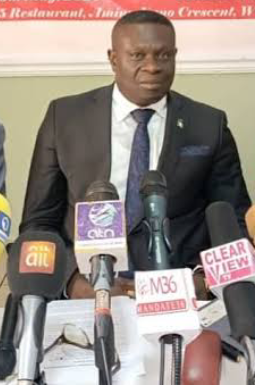
Written by Dr. Nwambu Gabriel,Director General, Centre for Credible Leadership and Citizens Awareness
Introduction
The journey to democratic governance in Nigeria has been fraught with challenges, conflicts, and untold sacrifices. Among the gallant figures who stood resilient in the face of adversity was Professor Humphrey Nwosu. As we mourn the loss of a remarkable leader and an indomitable champion of democracy, we reflect on his contributions and unwavering commitment to the electoral process, which laid a foundational path for Nigeria’s democratic practice.
A Visionary Electoral Leader
Professor Nwosu’s tenure as Chairman of Nigeria’s National Electoral Commission (NEC) from 1989 to 1993 marked a pivotal era in the nation’s electoral history. Unlike many of his contemporaries, Nwosu approached his responsibilities with an unwavering resolve to uphold the sanctity of the electoral process. He successfully organized several elections, including Local Government Chairmanship, Governorship, and State and National Assembly elections, which were lauded for their transparency and fairness. His most significant achievement came with the conduct of the June 12, 1993, presidential elections, widely regarded as one of the freest and fairest elections in Nigeria’s history.
Courageous Stand Against Adversity
In an environment characterized by military interference and political manipulation, Nwosu exemplified courage. He boldly overturned a court order issued on June 10, 1993, that sought to halt the presidential elections. Despite facing intense pressure from the military establishment led by Ibrahim Babangida (IBB), he remained resolute, emphasizing his commitment to ensuring that the elections were conducted as planned. His insistence on completing his mandate, even when his commission was dissolved midway through the electoral process, is a testament to his integrity and dedication.
His unyielding stance culminated in the announcement of results from 29 out of 30 states in the June 12 elections. Although General Ibrahim Babangida annulled the elections before Nwosu could declare the final results, his steadfastness demonstrated his belief in the democratic process and the necessity of honoring the voice of the Nigerian electorate.
Championing Democracy Through Documentation
Professor Nwosu did not allow the annulment of the June 12 elections to silence his voice. In his book, *Laying the Foundation of Nigeria’s Democracy: My Account of June 12, 1993 Presidential Election and Its Annulment*, he chronicled the events leading to the election and its aftermath. By publishing the results of the June 12 elections, he presented irrefutable evidence of MKO Abiola’s victory, reinforcing the notion that the people’s will should prevail over political machinations. This documentation serves as a historical account of a significant moment in Nigeria’s struggle for democracy and a rallying cry for future generations.
Legacy of Integrity
As we reflect on Professor Nwosu’s life and contributions, it is essential to recognize his legacy of integrity, bravery, and unwavering commitment to democratic principles. He stood as a beacon of hope during a tumultuous period in Nigerian history, proving that one individual’s resolute stand could indeed lead to monumental change. His story serves as an inspiration to current and future leaders to prioritize the will of the people over personal or political gain.
Conclusion
The passing of Professor Humphrey Nwosu is not just a loss to his family and friends but to a nation that desperately needs champions of democracy. His actions during the critical moments of June 12, 1993, solidified his place in history as a true man of democracy. As we commemorate his life, we are reminded that democracy thrives through the courage and integrity of individuals like Professor Nwosu—those who are willing to stand firm against oppression and ensure that the voice of the people is heard.
May his soul rest in peace, and may his legacy continue to inspire generations to uphold the values of democracy, transparency, and justice in Nigeria.
-
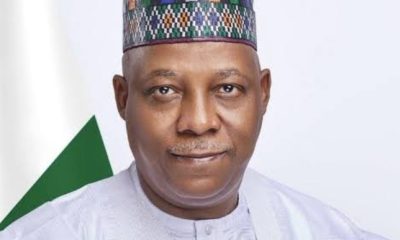
 News23 hours ago
News23 hours agoAPC opens up over alleged rift between Tinubu and his deputy, Shettima
-
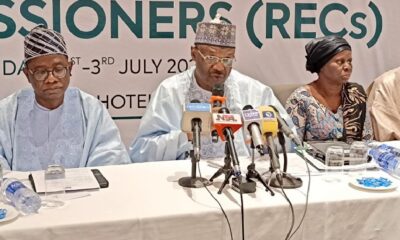
 News18 hours ago
News18 hours agoJust in: Presidency Insists INEC Chairman, Yakubu Not Sacked
-
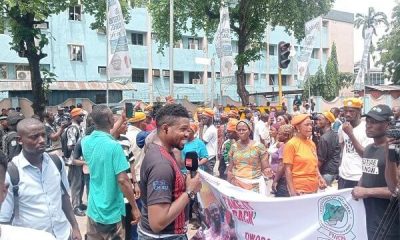
 News19 hours ago
News19 hours agoJUST IN: Police Nab leaders of April 7 nationwide protest
-
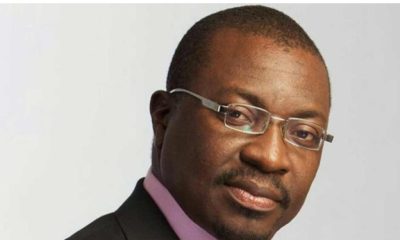
 News22 hours ago
News22 hours agoVeteran comedian opens can of worms, says I ‘ve caught many of my friends wives flirting with big men, govs
-

 News22 hours ago
News22 hours agoIn Burkina Faso we’re not in a democracy, but in a revolution, No Country develops in democracy” ~ Captain Ibrahim Traore.
-

 News18 hours ago
News18 hours agoJust in: Saudi Arabia Suspends Visa Issuance to Nigeria, 13 Other Countries
-

 News18 hours ago
News18 hours agoFG Orders NYSC To Stop Early Morning Drills For Corps Members
-

 Economy23 hours ago
Economy23 hours agoSEE Black Market Dollar To Naira Exchange Rate In Lagos, FCT, April 7th 2025





